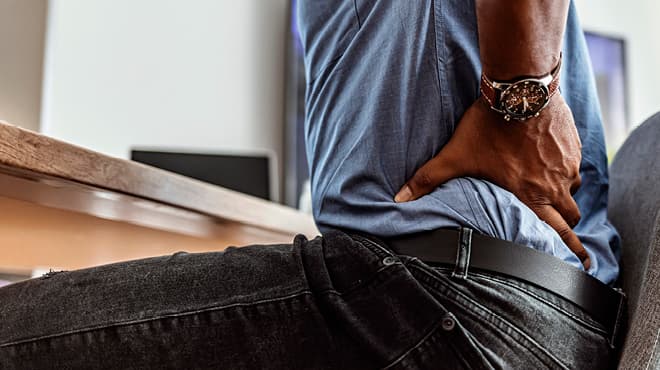Recent Posts
When should I see a doctor about back pain?

About 80% of adults experience back pain at some time in their lives. It's one of most common reasons people see a doctor or miss work. The pain can range from a dull ache to sharp, sudden and debilitating pain.
For most people, back pain is mechanical in nature, which means the elements of your back and how they move together has changed.
Possible back conditions could include:
- Muscle or ligament strain
Heavy lifting or a sudden awkward movement can strain the muscles or ligaments in your back. Also, if you are overweight or in poor physical condition, the constant strain on your back can cause muscle fatigue and muscle spasms. - Bulging or ruptured disk
Disks are the cushions between the bones in your spine. You can have bulging or ruptured disks that may or may not cause pain by compressing a nerve root and causing pain that radiates into the leg. - Arthritis
Disks may narrow over time and cause your vertebrae to grind together resulting pain.
Most back pain — even severe back pain — goes away on its own in four to six weeks with self-care, such as rest, heat or ice, over-the-counter pain medication and exercise.
Surgery often is effective to correct a spinal deformity or instability issue. Surgery also is helpful to treat pain radiating down a leg due to compression of a nerve root in the spine if other conservative treatments have failed. However, surgery is not considered a good treatment for generalized back pain.
So how do you know when to see your doctor about your back pain?
Here are a few causes or symptoms that indicate it is time to schedule an appointment:
- Follows a fall, blow to your back or other injury
- Is constant or intense pain, especially at night or when you lie down
- Spreads down one or both legs, especially if the pain extends below your knee
- Causes weakness, numbness or tingling in one or both legs
- Occurs with swelling or redness on your back, which could indicate an infection
- Occurs with unintended weight loss
- Occurs with new bowel or bladder control problems
Also, if you have a history of cancer, talk with your health care provider about any new pain you are experiencing, including back pain.
T.K. Schiefer, M.D., is a neurosurgeon in Eau Claire, Wisconsin.





